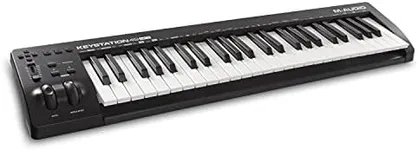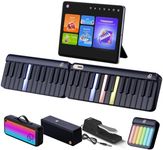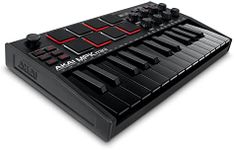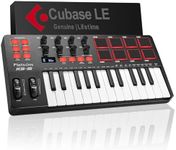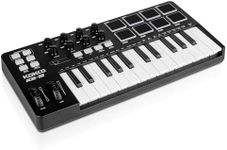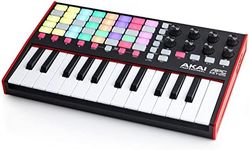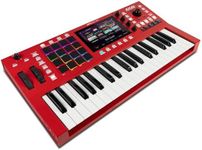Buying Guide for the Best Midi Keyboards
Choosing the right MIDI keyboard can significantly enhance your music production experience. A MIDI keyboard is an essential tool for musicians and producers, allowing you to control virtual instruments and other software. When selecting a MIDI keyboard, it's important to consider several key specifications to ensure it meets your needs and preferences. Understanding these specs will help you make an informed decision and find the best fit for your musical style and workflow.Number of KeysThe number of keys on a MIDI keyboard determines the range of notes you can play. This spec is important because it affects the versatility and playability of the keyboard. MIDI keyboards typically come with 25, 49, 61, or 88 keys. A 25-key keyboard is compact and portable, suitable for basic melodies and bass lines. A 49-key keyboard offers more range and is a good middle ground for most users. A 61-key keyboard provides even more range, ideal for more complex compositions. An 88-key keyboard is full-sized, similar to a traditional piano, and is best for classical pianists or those who need the full range of notes. Choose the number of keys based on your space, portability needs, and the complexity of the music you plan to create.
Key ActionKey action refers to how the keys feel and respond when pressed. This spec is important because it affects the playability and expressiveness of the keyboard. There are three main types of key action: synth-action, semi-weighted, and fully-weighted (hammer action). Synth-action keys are light and springy, suitable for fast playing and electronic music. Semi-weighted keys have a bit more resistance, providing a more piano-like feel while still being responsive. Fully-weighted keys mimic the feel of an acoustic piano, offering the most realistic playing experience. Choose the key action based on your playing style and preference. If you are a pianist, you might prefer fully-weighted keys, while electronic music producers might opt for synth-action keys.
ConnectivityConnectivity options determine how you can connect the MIDI keyboard to your computer or other devices. This spec is important because it affects the compatibility and ease of integration with your setup. Most MIDI keyboards connect via USB, which is simple and widely supported. Some keyboards also offer traditional 5-pin MIDI ports, which are useful for connecting to older hardware. Additionally, some models include Bluetooth for wireless connectivity. Choose the connectivity options based on your existing equipment and how you plan to use the keyboard. USB is generally sufficient for most users, but if you have older gear or want wireless freedom, consider those additional options.
Control FeaturesControl features refer to the additional buttons, knobs, faders, and pads on the MIDI keyboard. This spec is important because it enhances your ability to manipulate sounds and control your music software. Common control features include pitch and modulation wheels, transport controls, and assignable knobs and faders. Some keyboards also have drum pads for finger drumming and triggering samples. Choose the control features based on your workflow and the type of music you create. If you need hands-on control over your software, look for a keyboard with plenty of assignable controls. If you perform live, transport controls and drum pads might be particularly useful.
Software CompatibilitySoftware compatibility refers to how well the MIDI keyboard integrates with your digital audio workstation (DAW) and other music software. This spec is important because it affects the ease of use and functionality of the keyboard. Most MIDI keyboards are compatible with major DAWs like Ableton Live, Logic Pro, and FL Studio. Some keyboards come with dedicated software or presets that enhance integration with specific DAWs. Choose a MIDI keyboard that is compatible with your preferred DAW and any other software you use. Check for any included software bundles, as these can add value and expand your creative possibilities.
Build Quality and PortabilityBuild quality and portability refer to the construction and ease of transport of the MIDI keyboard. This spec is important because it affects the durability and convenience of the keyboard. A well-built keyboard will last longer and withstand the rigors of frequent use. Portability is crucial if you plan to take the keyboard to gigs or move it between different locations. Choose a MIDI keyboard with a sturdy build if you need something durable. If you need to travel with your keyboard, look for a lightweight and compact model. Consider the materials used and the overall design to ensure it meets your durability and portability needs.
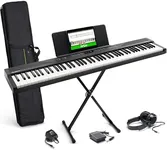
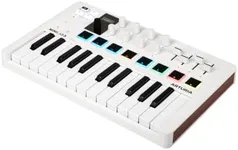
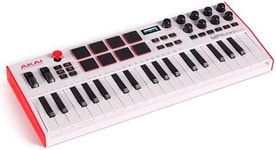
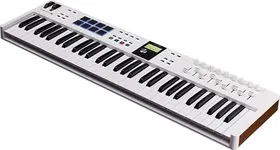
![Novation Launchkey 25 [MK4] — Compa](https://images-proxy.bestreviews.guide/caI270Q205AAZR9ZozgX74oDZVc=/0x150/https://m.media-amazon.com/images/I/31oD3QHsQcL._AC_CX679_.jpg)
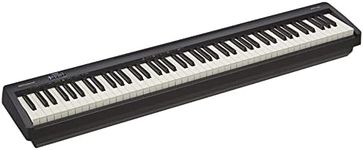
![Novation Launchkey Mini 25 [MK4] —](https://images-proxy.bestreviews.guide/6iOPo2KG1gIYdY5wBMaLi4-uVFI=/0x150/https://m.media-amazon.com/images/I/3172AnEOhbL._AC_CX679_.jpg)
